高一英语Unit4《Earthquakes》Period One精品学案
文档属性
| 名称 | 高一英语Unit4《Earthquakes》Period One精品学案 |
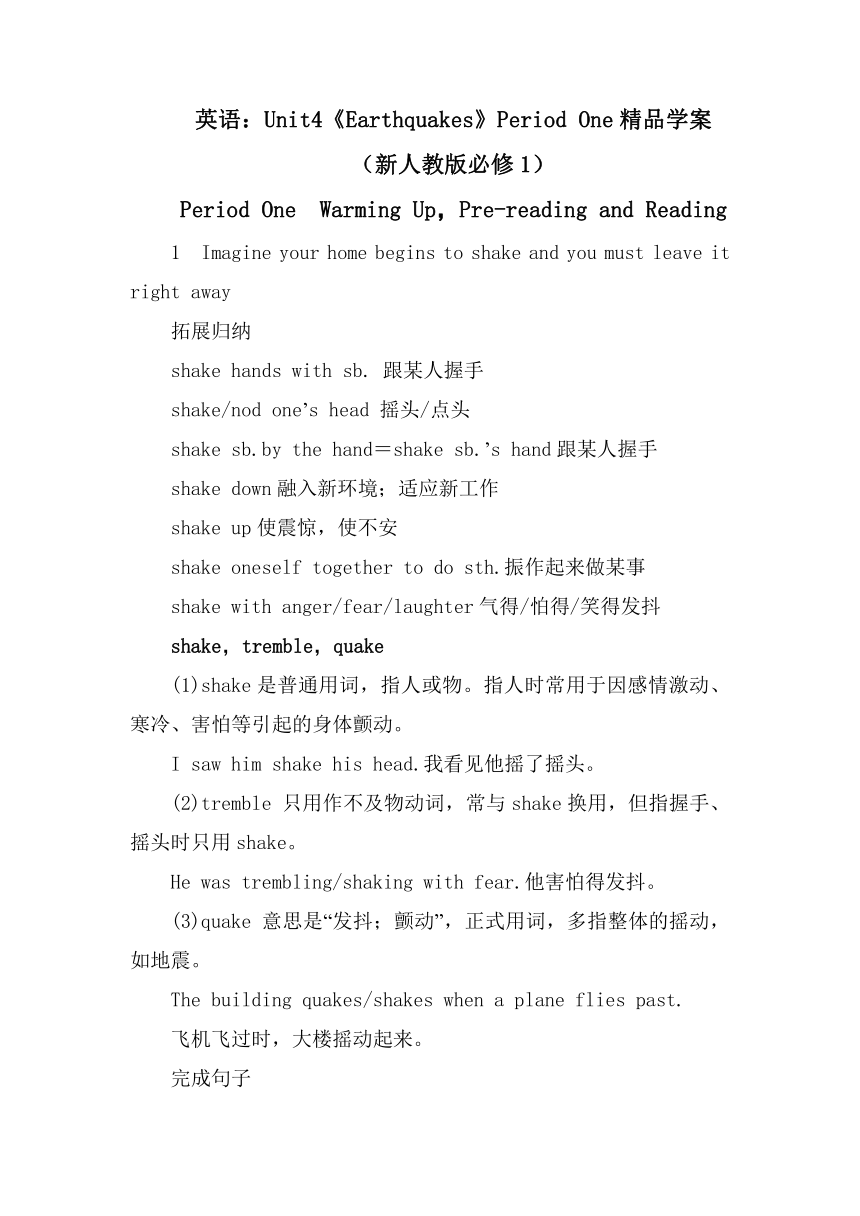
|
|
| 格式 | zip | ||
| 文件大小 | 23.1KB | ||
| 资源类型 | 教案 | ||
| 版本资源 | 人教版(新课程标准) | ||
| 科目 | 英语 | ||
| 更新时间 | 2012-10-09 00:00:00 | ||
图片预览

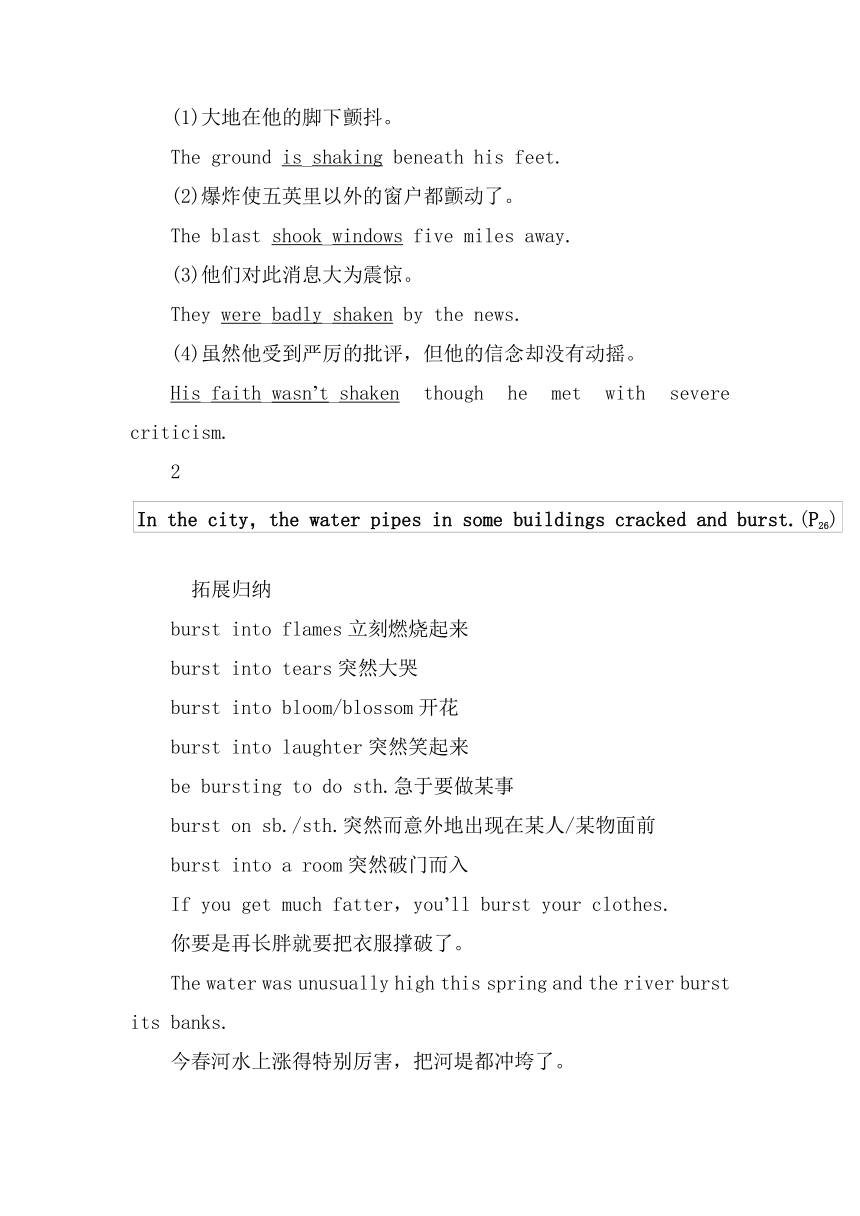
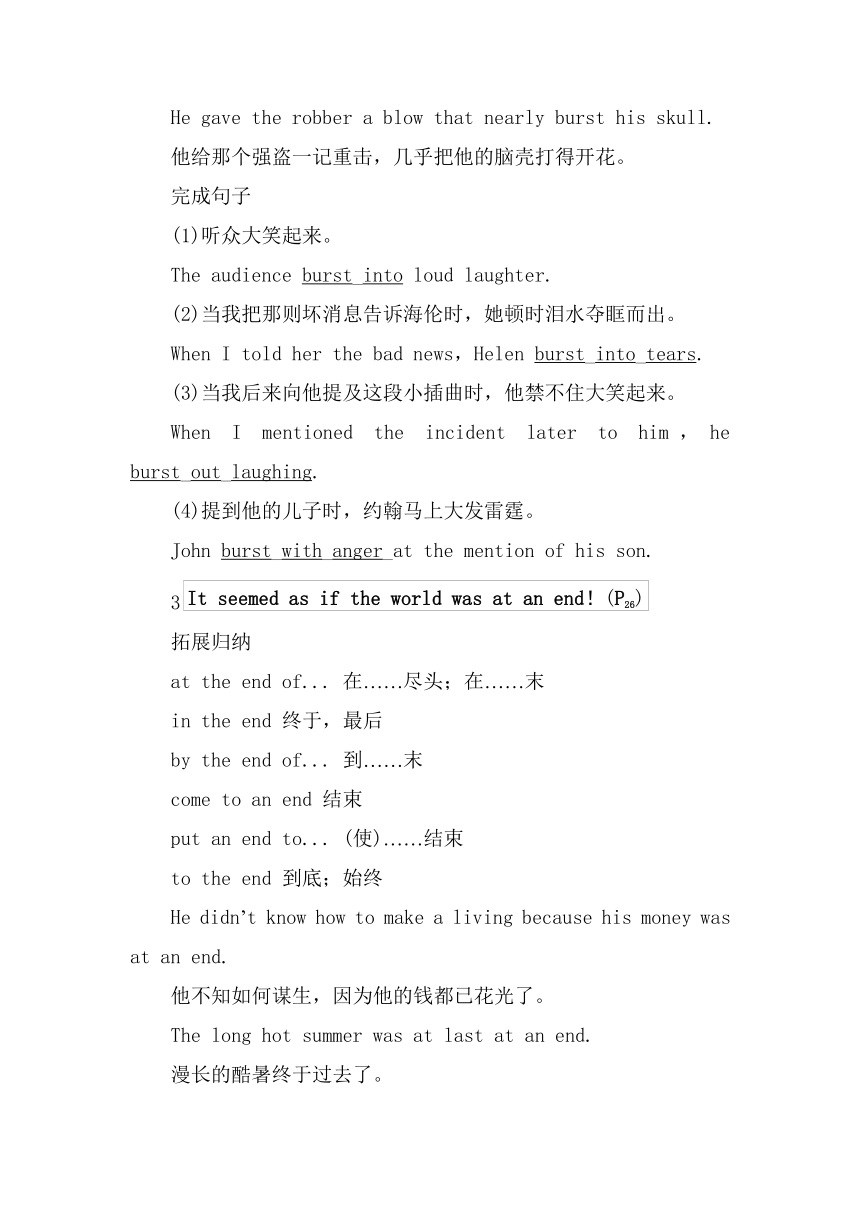
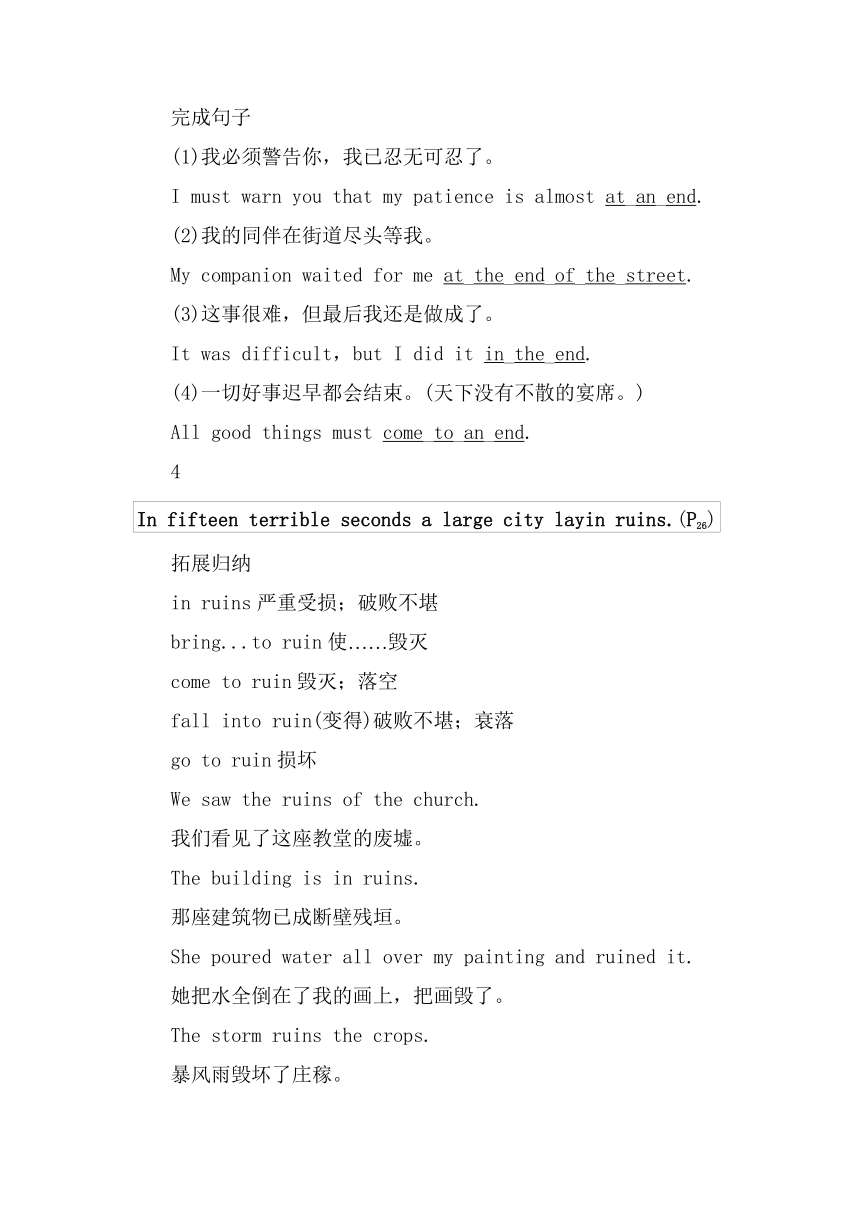
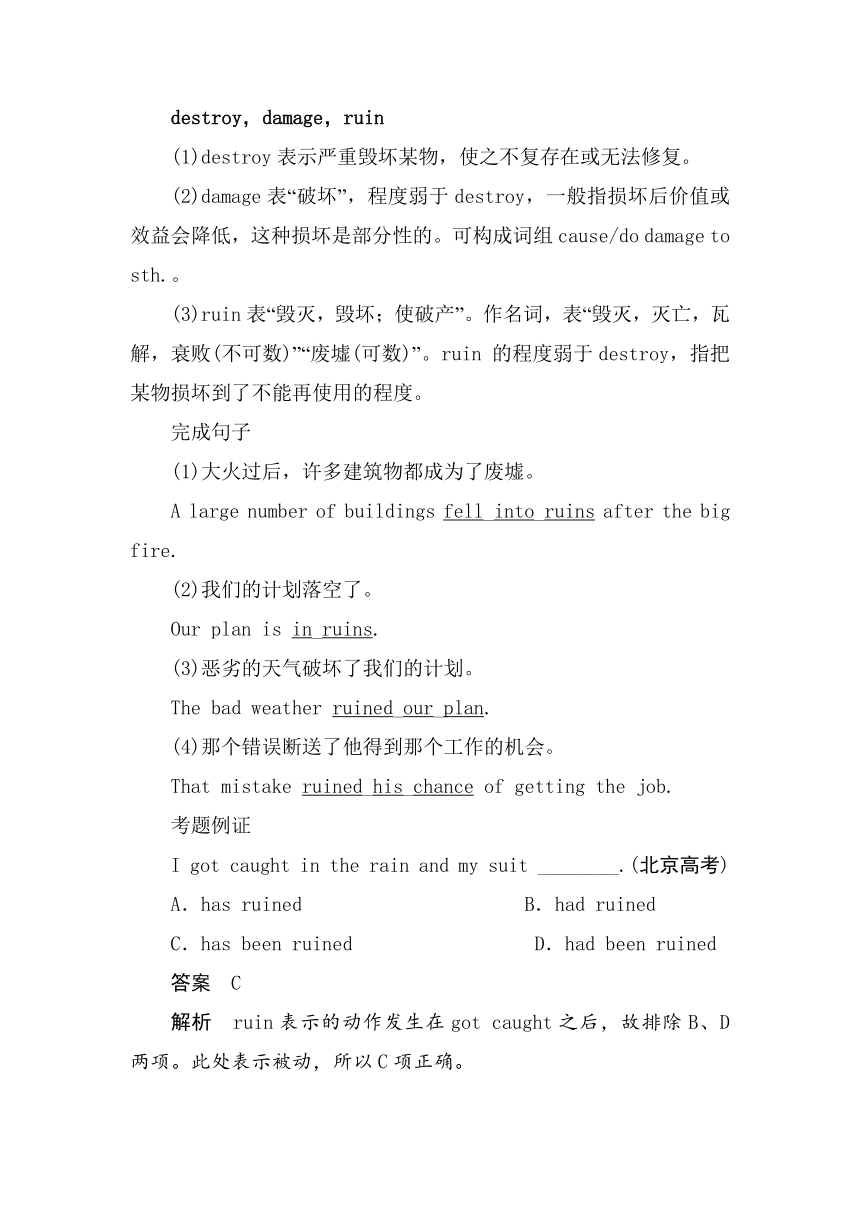
文档简介
英语:Unit4《Earthquakes》Period One精品学案
(新人教版必修1)
Period One Warming Up,Pre-reading and Reading
1 Imagine your home begins to shake and you must leave it right away
拓展归纳
shake hands with sb. 跟某人握手
shake/nod one’s head 摇头/点头
shake sb.by the hand=shake sb.’s hand跟某人握手
shake down融入新环境;适应新工作
shake up使震惊,使不安
shake oneself together to do sth.振作起来做某事
shake with anger/fear/laughter气得/怕得/笑得发抖
shake,tremble,quake
(1)shake是普通用词,指人或物。指人时常用于因感情激动、寒冷、害怕等引起的身体颤动。
I saw him shake his head.我看见他摇了摇头。
(2)tremble 只用作不及物动词,常与shake换用,但指握手、摇头时只用shake。
He was trembling/shaking with fear.他害怕得发抖。
(3)quake 意思是“发抖;颤动”,正式用词,多指整体的摇动,如地震。
The building quakes/shakes when a plane flies past.
飞机飞过时,大楼摇动起来。
完成句子
(1)大地在他的脚下颤抖。
The ground is_shaking beneath his feet.
(2)爆炸使五英里以外的窗户都颤动了。
The blast shook_windows five miles away.
(3)他们对此消息大为震惊。
They were_badly_shaken by the news.
(4)虽然他受到严厉的批评,但他的信念却没有动摇。
His_faith_wasn’t_shaken though he met with severe criticism.
2
?拓展归纳
burst into flames立刻燃烧起来
burst into tears突然大哭
burst into bloom/blossom开花
burst into laughter突然笑起来
be bursting to do sth.急于要做某事
burst on sb./sth.突然而意外地出现在某人/某物面前
burst into a room突然破门而入
If you get much fatter,you’ll burst your clothes.
你要是再长胖就要把衣服撑破了。
The water was unusually high this spring and the river burst its banks.
今春河水上涨得特别厉害,把河堤都冲垮了。
He gave the robber a blow that nearly burst his skull.
他给那个强盗一记重击,几乎把他的脑壳打得开花。
完成句子
(1)听众大笑起来。
The audience burst_into loud laughter.
(2)当我把那则坏消息告诉海伦时,她顿时泪水夺眶而出。
When I told her the bad news,Helen burst_into_tears.
(3)当我后来向他提及这段小插曲时,他禁不住大笑起来。
When I mentioned the incident later to him,he burst_out_laughing.
(4)提到他的儿子时,约翰马上大发雷霆。
John burst_with_anger_at the mention of his son.
3
拓展归纳
at the end of... 在……尽头;在……末
in the end 终于,最后
by the end of... 到……末
come to an end 结束
put an end to... (使)……结束
to the end 到底;始终
He didn’t know how to make a living because his money was at an end.
他不知如何谋生,因为他的钱都已花光了。
The long hot summer was at last at an end.
漫长的酷暑终于过去了。
完成句子
(1)我必须警告你,我已忍无可忍了。
I must warn you that my patience is almost at_an_end.
(2)我的同伴在街道尽头等我。
My companion waited for me at_the_end_of_the_street.
(3)这事很难,但最后我还是做成了。
It was difficult,but I did it in_the_end.
(4)一切好事迟早都会结束。(天下没有不散的宴席。)
All good things must come_to_an_end.
4
拓展归纳
in ruins严重受损;破败不堪
bring...to ruin使……毁灭
come to ruin毁灭;落空
fall into ruin(变得)破败不堪;衰落
go to ruin损坏
We saw the ruins of the church.
我们看见了这座教堂的废墟。
The building is in ruins.
那座建筑物已成断壁残垣。
She poured water all over my painting and ruined it.
她把水全倒在了我的画上,把画毁了。
The storm ruins the crops.
暴风雨毁坏了庄稼。
destroy,damage,ruin
(1)destroy表示严重毁坏某物,使之不复存在或无法修复。
(2)damage表“破坏”,程度弱于destroy,一般指损坏后价值或效益会降低,这种损坏是部分性的。可构成词组cause/do damage to sth.。
(3)ruin表“毁灭,毁坏;使破产”。作名词,表“毁灭,灭亡,瓦解,衰败(不可数)”“废墟(可数)”。ruin 的程度弱于destroy,指把某物损坏到了不能再使用的程度。
完成句子
(1)大火过后,许多建筑物都成为了废墟。
A large number of buildings fell_into_ruins after the big fire.
(2)我们的计划落空了。
Our plan is in_ruins.
(3)恶劣的天气破坏了我们的计划。
The bad weather ruined_our_plan.
(4)那个错误断送了他得到那个工作的机会。
That mistake ruined_his_chance of getting the job.
考题例证
I got caught in the rain and my suit ________.(北京高考)
A.has ruined B.had ruined
C.has been ruined D.had been ruined
答案 C
解析 ruin表示的动作发生在got caught之后,故排除B、D两项。此处表示被动,所以C项正确。
5
injure,wound,hurt
(1)injure一般指由于意外或事故而造成伤害,也可以表示损害名誉、伤害感情等。
He was slightly injured in the accident.
他在意外事故中受了轻伤。
If you work like this,you will injure your own health.
如果你这样工作的话,你将会损害自己的健康。
(2)wound多指外伤,如枪伤、刀伤、剑伤,尤指在战争或战斗中受伤。
(3)hurt是一般用语,指肉体或精神上的伤害,常伴有强烈的疼痛感,还可表示“疼;痛”。
用wound,hurt,injure的适当形式填空
(1)About fifty people were seriously wounded in the attack.
(2)I didn’t want to hurt his feelings.
(3)This could seriously injure the company’s reputation.
考题例证
Mike didn’t play football yesterday because he had ______his leg.(全国Ⅰ高考)
A.damaged B.hurt C.hit D.struck
答案 B
解析 本题考查动词词义辨析。damage指“破坏,损坏”;hurt“伤害,使……受伤”;hit“击中,打中”;strike指“击打,敲打”。句意为:Mike不能踢球是因为他的腿受伤了。故hurt符合要求。
6 People were shoked
拓展归纳
be shocked at/by (doing) sth.对(做)某事感到震惊
be shocked to do sth.惧怕做某事
It shocked sb.to see/hear...看见/听到……使某人震惊
(be) a shock to sb.对某人来说是个打击
It shocked me to see how my neighbours treated their children.
看到邻居们如何对待孩子,我感到很震惊。
I was shocked when I heard about your accident.
当我听到你出事后我很震惊。
My father was shocked.
我的父亲极为震惊。
完成句子
(1)The child’s bad language shocks_everyone(使大家都感到震惊).
(2)I was afraid of shocking_her(惊动她).
(3)He_was_shocked_at_her_smoking(对她抽烟感到震惊).
(4)The news gave me a_great_shock(一个很大的打击).
7 But the one million people of the city,who thought little of these events,were asleep as usual that night.(P26)
拓展归纳
think well of对……评价好
think highly of对……评价高
think poorly of对……评价低
think much of重视
think nothing of不重视
完成句子
(1)她认为一天走三十英里没什么。
She thinks_nothing_of walking thirty miles a day.
(2)我对我的新英语老师评价不高。
I don’t_think_highly_of my new English teacher.
(3)他的作品受到评论家的高度评价。
His works is_highly_thought_of by the critics.
8 Sand now filed the wells instead of water
instead,instead of
(1)instead代替,然而。
(2)instead of代替,而不,而没有,不能与in place of替换,但可以与rather than互换。
They went there by bus instead of (rather than) on foot.
他们乘车去那儿而不是步行。
注意:instead of+doing/pron./prep.phrase/n.
(3)instead为副词,一般放在句末,否定上文提到的事物,而instead of则为介词短语,一般放在句首或句中,否定of后面的宾语。
If you cannot go,he’ll go instead (of you).
如果你不能去,他将代替你去。
?翻译句子
(1)我要去看的是她而不是你。
I_will_go_to_see_her_instead_of_you.
(2)我哥哥病了,我代他来。
I_have_come_instead_of_my_brother.He_is_ill.
(3)我必须完成工作,不能外出。
I_have_to_finish_my_work_instead_of_going_out.
9 Strange things were happening in the countryside of northeast Hebei.河北省东北部的农村不断有些怪事发生。
?用法点拨
(1)此句用过去进行时表示在过去某段时间内连续发生的动作。句中的谓语动词happen作“发生”解。
(2)sb.happen to do sth.意为“某人碰巧/恰好做某事”。其中不定式可以是to do(一般式)/to have done(完成式)/to be doing(进行式)。
I happened to see her yesterday.我昨天碰巧见到她。
She happened to have just finished reading the book.
碰巧她刚刚读完那本书。
(3)It(so)happens that...“(如此)碰巧,恰好”。
It happened that there was a telephone booth nearby.
碰巧在附近有个电话亭。
(4)happen to sb./sth.“某人/物出事或发生了……情况”。
It can happen to anyone.这事可能发生在任何人身上。
单项填空
(1)—We haven’t heard from Jane for a long time.
—What do you suppose ________ to her
A.was happening B.to happen
C.has happened D.having happened
答案 C
(2)They happened to ________ for Tianjin when we got there.
A.leave B.have left C.leaving D.had left
答案 A
(3)If anything ________ you,let me know.
A.is happened to B.is happening C.happens on D.happens to
答案 D
(4)I happened ________ it in some book,so I know the answer.
A.to read B.to have read
C.that I have read D.that I had read
答案 B
10 In the farmyards,the chickens and even the pigs were too nervous to eat.在农家小院里,小鸡还有猪都紧张得不吃东西。
用法点拨
too...to...结构的用法:
(1)短语too nervous to eat在句子中作表语,意思为“太紧张了而不吃食”,注意词组too...to...意为“太……而不能……”。
Li Ping’s brother is too young to join the army.
李平的弟弟年纪太小而不能参军。
(2)too...to...可以由词组be not...enough to...替换,上面的例句可以转换为:
Li Ping’s brother is not old enough to join the army.
李平的弟弟年纪太小而不能参军。
(3)“too+adj.+to do”有时表肯定意义。
They were too glad to hear the news.
他们听到这个消息非常高兴。
They seemed to be too nervous and too anxious to leave.
他们似乎非常紧张,急着想离开。
?翻译句子
(1)活到老,学到老。
One_is_never_too_old_to_learn.
(2)我将极高兴地回家。
I_shall_be_only_too_pleased_to_get_home.
(3)听到不幸的消息他太悲伤了。
He_is_too_sad_to_hear_the_bad_news.
11
用法点拨
这是一个部分否定句。
(1)表示“全体”意义的代词、形容词或副词,如all,both,every,everything,everybody等,和否定副词not连用可构成部分否定。
All the students in our class haven’t seen him.
并非全班同学都见过他。
Both of the boys aren’t good at English.
并非两个男孩的英语都好。
(2)全部否定,通常要把这些具有总体意思的词改为相应的否定词,如none,neither,nothing,nobody,no等。
完成句子
(1)此事并非人人皆知。
Everybody_doesn’t know it.
(2)全班同学没人见过他。
None_of_the_students in our class have seen him.
(3)两个男孩的英语都不好。
Neither_of_the_boys_is good at English.
(4)没人知道此事。
Nobody/No_one knows it.
考题例证
You may drop in or just give me a call.________ will do.(安徽高考)
A.Either B.Each C.Neither D.All
答案 A
解析 从前句drop in or give me a call可知,选项表示两者必居其一。
12
用法点拨
(1)as if是连词词组,意为“好像,好似”,相当于as though,一般用于句型It looks/seems as if...中,其意思是“看起来好像……”。其中it为形式主语,没有实际意义。look/seem是连系动词,as if引导的是表语从句。如果所引导的从句表示的情况接近事实,句子要用陈述语气。
除此之外,as if也可以引导方式状语从句,修饰主句中的谓语,此时从句中的谓语动词常用虚拟语气。
①从句动词在时间上与主句动词同时发生,从句动词用过去式。
②从句动词在时间上比主句动词早发生,从句动词用had done。
③从句动词在时间上比主句动词晚发生,从句动词用would/could/might+do。
It looks as if the shirt hadn’t been washed following the instructions.
看来,这件衬衫好像没有按照说明进行洗涤。
It seemed as if the bag had been pressed by something heavy.
看来这个包被什么重东西压过。
He acts(acted) as if(as though) he were an expert.
他表现得就像个专家。
They talked (are talking) as if (as though) they had been friends for years.他们谈起话来就像多年的老朋友。
She acts as if she would go to the moon.
她的表现就好像是要去月球似的。
(2)It seems that句型也可以转换成“主语+seem+动词不定式”,其意思不变。如果动词不定式为“to be+形容词”,to be往往省略。
It seems that she is happy.=She seems to be happy.
她似乎很开心。
It seems that he has found a new job.
=He seems to have found a new job.
他看起来已经找到了一份新工作。
It seems that they are arguing about the taxi fare.
=They seem to be arguing about the taxi fare.
他们似乎正在为出租车费而争执。
句型转换
(1)The girl seems much better today than yesterday.
It seems that the girl is much better today than yesterday.
(2)It seems that they have known about it.
They seem to_ have_ known about it.
(3)It seems that he is not rich.
He seems not _to_ be rich.
He doesn’t _seem to be rich.
译文
地球的一个不眠之夜
河北省东北部的农村不断有些怪事发生。三天来,村子里的井水升升降降,起起伏伏。农夫注意到,水井的井壁上有深深的裂缝,裂缝里冒出臭气。农家大院里的鸡,甚至猪都紧张得不想吃食。老鼠从田地里跑出来找地方藏身。鱼缸和池塘里的鱼会往外跳。在1976年7月28日凌晨3点左右,有些人看到天上一道道明亮的光。即使天空没有飞机,在唐山城外也可以听到飞机声。在市内,有些建筑物里的水管爆裂开来。但是,唐山市的一百万居民几乎都没有把这些情况当一回事,当天晚上照常睡着了。
在凌晨3点42分,一切都开始摇晃起来。世界似乎到了末日!二十世纪最大的一次地震就在唐山市正下方11公里处发生了。100公里以外的北京市都感到了地震,全国1/3的地方都有震感。一条8公里长30米宽的巨大裂缝横穿房舍、马路和渠道。地上一些洞穴冒出了蒸气。石头山变成了泥沙河。在可怕的15秒钟内,一座大城市就沉沦在一片废墟之中。人们遭受的灾难极为深重。2/3的人在地震中死去或受伤。成千上万个家庭遇难,许多孩子变成了孤儿。死伤的人数达到40多万。
幸存的人们又怎么能相信这是自然现象呢?人们无论朝哪里看,哪里的一切都几乎被毁了。所有的市内医院、75%的工厂和建筑物、90%的家园都消失了。残砖就像秋天的红叶覆盖着大地,然而它们是不可能被风刮走的。两座大坝垮了,多数桥梁不是塌了就是无法安全通行了。铁轨如今成了一条条废钢。好几万头牛再也挤不出奶来。50万头猪和几百万只鸡全都死了。井里满是沙子,而不是水。人们惊呆了。接着,在下午晚些时候,又一次和第一次一样的强烈的地震震撼着唐山。有些医生和救援人员被困在废墟下面。更多的房屋倒塌了。水、电和食物都很难弄到。人们开始纳闷,这场灾难还会持续多久。
不是所有的希望都破灭了。地震后不久,部队派了15万名战士到唐山来协助救援人员。数十万的人得到了救助。部队人员组成小分队,将受困的人们挖出来,将死者掩埋。在唐山市的北边,有一个万名矿工煤矿,其中多数人得救了。援救人员为那些家园被毁的幸存者盖起了避难所。用火车、卡车和飞机向市内运来了水。慢慢地,这座城市又开始出现了生机。
(新人教版必修1)
Period One Warming Up,Pre-reading and Reading
1 Imagine your home begins to shake and you must leave it right away
拓展归纳
shake hands with sb. 跟某人握手
shake/nod one’s head 摇头/点头
shake sb.by the hand=shake sb.’s hand跟某人握手
shake down融入新环境;适应新工作
shake up使震惊,使不安
shake oneself together to do sth.振作起来做某事
shake with anger/fear/laughter气得/怕得/笑得发抖
shake,tremble,quake
(1)shake是普通用词,指人或物。指人时常用于因感情激动、寒冷、害怕等引起的身体颤动。
I saw him shake his head.我看见他摇了摇头。
(2)tremble 只用作不及物动词,常与shake换用,但指握手、摇头时只用shake。
He was trembling/shaking with fear.他害怕得发抖。
(3)quake 意思是“发抖;颤动”,正式用词,多指整体的摇动,如地震。
The building quakes/shakes when a plane flies past.
飞机飞过时,大楼摇动起来。
完成句子
(1)大地在他的脚下颤抖。
The ground is_shaking beneath his feet.
(2)爆炸使五英里以外的窗户都颤动了。
The blast shook_windows five miles away.
(3)他们对此消息大为震惊。
They were_badly_shaken by the news.
(4)虽然他受到严厉的批评,但他的信念却没有动摇。
His_faith_wasn’t_shaken though he met with severe criticism.
2
?拓展归纳
burst into flames立刻燃烧起来
burst into tears突然大哭
burst into bloom/blossom开花
burst into laughter突然笑起来
be bursting to do sth.急于要做某事
burst on sb./sth.突然而意外地出现在某人/某物面前
burst into a room突然破门而入
If you get much fatter,you’ll burst your clothes.
你要是再长胖就要把衣服撑破了。
The water was unusually high this spring and the river burst its banks.
今春河水上涨得特别厉害,把河堤都冲垮了。
He gave the robber a blow that nearly burst his skull.
他给那个强盗一记重击,几乎把他的脑壳打得开花。
完成句子
(1)听众大笑起来。
The audience burst_into loud laughter.
(2)当我把那则坏消息告诉海伦时,她顿时泪水夺眶而出。
When I told her the bad news,Helen burst_into_tears.
(3)当我后来向他提及这段小插曲时,他禁不住大笑起来。
When I mentioned the incident later to him,he burst_out_laughing.
(4)提到他的儿子时,约翰马上大发雷霆。
John burst_with_anger_at the mention of his son.
3
拓展归纳
at the end of... 在……尽头;在……末
in the end 终于,最后
by the end of... 到……末
come to an end 结束
put an end to... (使)……结束
to the end 到底;始终
He didn’t know how to make a living because his money was at an end.
他不知如何谋生,因为他的钱都已花光了。
The long hot summer was at last at an end.
漫长的酷暑终于过去了。
完成句子
(1)我必须警告你,我已忍无可忍了。
I must warn you that my patience is almost at_an_end.
(2)我的同伴在街道尽头等我。
My companion waited for me at_the_end_of_the_street.
(3)这事很难,但最后我还是做成了。
It was difficult,but I did it in_the_end.
(4)一切好事迟早都会结束。(天下没有不散的宴席。)
All good things must come_to_an_end.
4
拓展归纳
in ruins严重受损;破败不堪
bring...to ruin使……毁灭
come to ruin毁灭;落空
fall into ruin(变得)破败不堪;衰落
go to ruin损坏
We saw the ruins of the church.
我们看见了这座教堂的废墟。
The building is in ruins.
那座建筑物已成断壁残垣。
She poured water all over my painting and ruined it.
她把水全倒在了我的画上,把画毁了。
The storm ruins the crops.
暴风雨毁坏了庄稼。
destroy,damage,ruin
(1)destroy表示严重毁坏某物,使之不复存在或无法修复。
(2)damage表“破坏”,程度弱于destroy,一般指损坏后价值或效益会降低,这种损坏是部分性的。可构成词组cause/do damage to sth.。
(3)ruin表“毁灭,毁坏;使破产”。作名词,表“毁灭,灭亡,瓦解,衰败(不可数)”“废墟(可数)”。ruin 的程度弱于destroy,指把某物损坏到了不能再使用的程度。
完成句子
(1)大火过后,许多建筑物都成为了废墟。
A large number of buildings fell_into_ruins after the big fire.
(2)我们的计划落空了。
Our plan is in_ruins.
(3)恶劣的天气破坏了我们的计划。
The bad weather ruined_our_plan.
(4)那个错误断送了他得到那个工作的机会。
That mistake ruined_his_chance of getting the job.
考题例证
I got caught in the rain and my suit ________.(北京高考)
A.has ruined B.had ruined
C.has been ruined D.had been ruined
答案 C
解析 ruin表示的动作发生在got caught之后,故排除B、D两项。此处表示被动,所以C项正确。
5
injure,wound,hurt
(1)injure一般指由于意外或事故而造成伤害,也可以表示损害名誉、伤害感情等。
He was slightly injured in the accident.
他在意外事故中受了轻伤。
If you work like this,you will injure your own health.
如果你这样工作的话,你将会损害自己的健康。
(2)wound多指外伤,如枪伤、刀伤、剑伤,尤指在战争或战斗中受伤。
(3)hurt是一般用语,指肉体或精神上的伤害,常伴有强烈的疼痛感,还可表示“疼;痛”。
用wound,hurt,injure的适当形式填空
(1)About fifty people were seriously wounded in the attack.
(2)I didn’t want to hurt his feelings.
(3)This could seriously injure the company’s reputation.
考题例证
Mike didn’t play football yesterday because he had ______his leg.(全国Ⅰ高考)
A.damaged B.hurt C.hit D.struck
答案 B
解析 本题考查动词词义辨析。damage指“破坏,损坏”;hurt“伤害,使……受伤”;hit“击中,打中”;strike指“击打,敲打”。句意为:Mike不能踢球是因为他的腿受伤了。故hurt符合要求。
6 People were shoked
拓展归纳
be shocked at/by (doing) sth.对(做)某事感到震惊
be shocked to do sth.惧怕做某事
It shocked sb.to see/hear...看见/听到……使某人震惊
(be) a shock to sb.对某人来说是个打击
It shocked me to see how my neighbours treated their children.
看到邻居们如何对待孩子,我感到很震惊。
I was shocked when I heard about your accident.
当我听到你出事后我很震惊。
My father was shocked.
我的父亲极为震惊。
完成句子
(1)The child’s bad language shocks_everyone(使大家都感到震惊).
(2)I was afraid of shocking_her(惊动她).
(3)He_was_shocked_at_her_smoking(对她抽烟感到震惊).
(4)The news gave me a_great_shock(一个很大的打击).
7 But the one million people of the city,who thought little of these events,were asleep as usual that night.(P26)
拓展归纳
think well of对……评价好
think highly of对……评价高
think poorly of对……评价低
think much of重视
think nothing of不重视
完成句子
(1)她认为一天走三十英里没什么。
She thinks_nothing_of walking thirty miles a day.
(2)我对我的新英语老师评价不高。
I don’t_think_highly_of my new English teacher.
(3)他的作品受到评论家的高度评价。
His works is_highly_thought_of by the critics.
8 Sand now filed the wells instead of water
instead,instead of
(1)instead代替,然而。
(2)instead of代替,而不,而没有,不能与in place of替换,但可以与rather than互换。
They went there by bus instead of (rather than) on foot.
他们乘车去那儿而不是步行。
注意:instead of+doing/pron./prep.phrase/n.
(3)instead为副词,一般放在句末,否定上文提到的事物,而instead of则为介词短语,一般放在句首或句中,否定of后面的宾语。
If you cannot go,he’ll go instead (of you).
如果你不能去,他将代替你去。
?翻译句子
(1)我要去看的是她而不是你。
I_will_go_to_see_her_instead_of_you.
(2)我哥哥病了,我代他来。
I_have_come_instead_of_my_brother.He_is_ill.
(3)我必须完成工作,不能外出。
I_have_to_finish_my_work_instead_of_going_out.
9 Strange things were happening in the countryside of northeast Hebei.河北省东北部的农村不断有些怪事发生。
?用法点拨
(1)此句用过去进行时表示在过去某段时间内连续发生的动作。句中的谓语动词happen作“发生”解。
(2)sb.happen to do sth.意为“某人碰巧/恰好做某事”。其中不定式可以是to do(一般式)/to have done(完成式)/to be doing(进行式)。
I happened to see her yesterday.我昨天碰巧见到她。
She happened to have just finished reading the book.
碰巧她刚刚读完那本书。
(3)It(so)happens that...“(如此)碰巧,恰好”。
It happened that there was a telephone booth nearby.
碰巧在附近有个电话亭。
(4)happen to sb./sth.“某人/物出事或发生了……情况”。
It can happen to anyone.这事可能发生在任何人身上。
单项填空
(1)—We haven’t heard from Jane for a long time.
—What do you suppose ________ to her
A.was happening B.to happen
C.has happened D.having happened
答案 C
(2)They happened to ________ for Tianjin when we got there.
A.leave B.have left C.leaving D.had left
答案 A
(3)If anything ________ you,let me know.
A.is happened to B.is happening C.happens on D.happens to
答案 D
(4)I happened ________ it in some book,so I know the answer.
A.to read B.to have read
C.that I have read D.that I had read
答案 B
10 In the farmyards,the chickens and even the pigs were too nervous to eat.在农家小院里,小鸡还有猪都紧张得不吃东西。
用法点拨
too...to...结构的用法:
(1)短语too nervous to eat在句子中作表语,意思为“太紧张了而不吃食”,注意词组too...to...意为“太……而不能……”。
Li Ping’s brother is too young to join the army.
李平的弟弟年纪太小而不能参军。
(2)too...to...可以由词组be not...enough to...替换,上面的例句可以转换为:
Li Ping’s brother is not old enough to join the army.
李平的弟弟年纪太小而不能参军。
(3)“too+adj.+to do”有时表肯定意义。
They were too glad to hear the news.
他们听到这个消息非常高兴。
They seemed to be too nervous and too anxious to leave.
他们似乎非常紧张,急着想离开。
?翻译句子
(1)活到老,学到老。
One_is_never_too_old_to_learn.
(2)我将极高兴地回家。
I_shall_be_only_too_pleased_to_get_home.
(3)听到不幸的消息他太悲伤了。
He_is_too_sad_to_hear_the_bad_news.
11
用法点拨
这是一个部分否定句。
(1)表示“全体”意义的代词、形容词或副词,如all,both,every,everything,everybody等,和否定副词not连用可构成部分否定。
All the students in our class haven’t seen him.
并非全班同学都见过他。
Both of the boys aren’t good at English.
并非两个男孩的英语都好。
(2)全部否定,通常要把这些具有总体意思的词改为相应的否定词,如none,neither,nothing,nobody,no等。
完成句子
(1)此事并非人人皆知。
Everybody_doesn’t know it.
(2)全班同学没人见过他。
None_of_the_students in our class have seen him.
(3)两个男孩的英语都不好。
Neither_of_the_boys_is good at English.
(4)没人知道此事。
Nobody/No_one knows it.
考题例证
You may drop in or just give me a call.________ will do.(安徽高考)
A.Either B.Each C.Neither D.All
答案 A
解析 从前句drop in or give me a call可知,选项表示两者必居其一。
12
用法点拨
(1)as if是连词词组,意为“好像,好似”,相当于as though,一般用于句型It looks/seems as if...中,其意思是“看起来好像……”。其中it为形式主语,没有实际意义。look/seem是连系动词,as if引导的是表语从句。如果所引导的从句表示的情况接近事实,句子要用陈述语气。
除此之外,as if也可以引导方式状语从句,修饰主句中的谓语,此时从句中的谓语动词常用虚拟语气。
①从句动词在时间上与主句动词同时发生,从句动词用过去式。
②从句动词在时间上比主句动词早发生,从句动词用had done。
③从句动词在时间上比主句动词晚发生,从句动词用would/could/might+do。
It looks as if the shirt hadn’t been washed following the instructions.
看来,这件衬衫好像没有按照说明进行洗涤。
It seemed as if the bag had been pressed by something heavy.
看来这个包被什么重东西压过。
He acts(acted) as if(as though) he were an expert.
他表现得就像个专家。
They talked (are talking) as if (as though) they had been friends for years.他们谈起话来就像多年的老朋友。
She acts as if she would go to the moon.
她的表现就好像是要去月球似的。
(2)It seems that句型也可以转换成“主语+seem+动词不定式”,其意思不变。如果动词不定式为“to be+形容词”,to be往往省略。
It seems that she is happy.=She seems to be happy.
她似乎很开心。
It seems that he has found a new job.
=He seems to have found a new job.
他看起来已经找到了一份新工作。
It seems that they are arguing about the taxi fare.
=They seem to be arguing about the taxi fare.
他们似乎正在为出租车费而争执。
句型转换
(1)The girl seems much better today than yesterday.
It seems that the girl is much better today than yesterday.
(2)It seems that they have known about it.
They seem to_ have_ known about it.
(3)It seems that he is not rich.
He seems not _to_ be rich.
He doesn’t _seem to be rich.
译文
地球的一个不眠之夜
河北省东北部的农村不断有些怪事发生。三天来,村子里的井水升升降降,起起伏伏。农夫注意到,水井的井壁上有深深的裂缝,裂缝里冒出臭气。农家大院里的鸡,甚至猪都紧张得不想吃食。老鼠从田地里跑出来找地方藏身。鱼缸和池塘里的鱼会往外跳。在1976年7月28日凌晨3点左右,有些人看到天上一道道明亮的光。即使天空没有飞机,在唐山城外也可以听到飞机声。在市内,有些建筑物里的水管爆裂开来。但是,唐山市的一百万居民几乎都没有把这些情况当一回事,当天晚上照常睡着了。
在凌晨3点42分,一切都开始摇晃起来。世界似乎到了末日!二十世纪最大的一次地震就在唐山市正下方11公里处发生了。100公里以外的北京市都感到了地震,全国1/3的地方都有震感。一条8公里长30米宽的巨大裂缝横穿房舍、马路和渠道。地上一些洞穴冒出了蒸气。石头山变成了泥沙河。在可怕的15秒钟内,一座大城市就沉沦在一片废墟之中。人们遭受的灾难极为深重。2/3的人在地震中死去或受伤。成千上万个家庭遇难,许多孩子变成了孤儿。死伤的人数达到40多万。
幸存的人们又怎么能相信这是自然现象呢?人们无论朝哪里看,哪里的一切都几乎被毁了。所有的市内医院、75%的工厂和建筑物、90%的家园都消失了。残砖就像秋天的红叶覆盖着大地,然而它们是不可能被风刮走的。两座大坝垮了,多数桥梁不是塌了就是无法安全通行了。铁轨如今成了一条条废钢。好几万头牛再也挤不出奶来。50万头猪和几百万只鸡全都死了。井里满是沙子,而不是水。人们惊呆了。接着,在下午晚些时候,又一次和第一次一样的强烈的地震震撼着唐山。有些医生和救援人员被困在废墟下面。更多的房屋倒塌了。水、电和食物都很难弄到。人们开始纳闷,这场灾难还会持续多久。
不是所有的希望都破灭了。地震后不久,部队派了15万名战士到唐山来协助救援人员。数十万的人得到了救助。部队人员组成小分队,将受困的人们挖出来,将死者掩埋。在唐山市的北边,有一个万名矿工煤矿,其中多数人得救了。援救人员为那些家园被毁的幸存者盖起了避难所。用火车、卡车和飞机向市内运来了水。慢慢地,这座城市又开始出现了生机。
